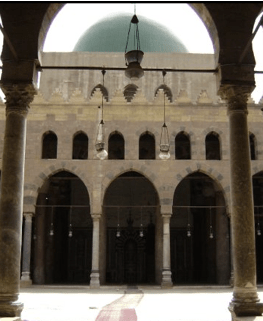A guest post by Alise Coen, University of Wisconsin-Sheboygan

Depictions of Islam and Muslim identity in the United States have gained renewed attention with President Trump’s January 2017 executive order temporarily barring immigrants from seven Muslim-majority countries and indefinitely suspending the entry of all Syrian refugees. Legal scholars, advocacy groups, and the federal courts have been debating the constitutionality of the executive order. One concern is that it may be in tension with the U.S. Constitution’s Establishment Clause by favoring the entry of Christian refugees over Muslim refugees and by targeting countries with Muslim populations in an attempt to partially implement earlier campaign promises regarding a ban on Muslims entering the United States. Concerns about executive actions on immigration that discriminate against Muslims, the potential creation of a Muslim registry, rhetoric among lawmakers supporting the internment of Muslims, and a recent effort to revise U.S. counter-extremism to focus exclusively on Islamic extremism underscore the importance of understanding how Islam and Muslims are constructed in U.S. political discourse.
In a new article published in Politics and Religion, I investigate enduring and evolving themes in depictions of Islam in U.S. Senate rhetoric. To understand the impact of the September 11, 2001 attacks in shaping these depictions, I compare Senate discourse pertaining to Islam and Muslims across two time periods—the 106th (1999-2000) and 111th (2009-2010) Congresses. Using transcripts of speeches in the Congressional Record, I identify several important patterns. One prominent theme is the extent to which Islam and Muslims have been securitized—that is, deemed as threatening to American society and national security. For example, U.S. senators often referenced aspects of Islam or its followers in the context of securitized terms like war, death, missiles, bomb, nuclear proliferation, militants, attacks, terrorism, murder, kill, bloodshed, conflict and similar language that invokes fear and links Islam and Muslims with violence.
While the September 11th attacks did appear to produce an increase in securitization and more negative depictions of Islam in Senate rhetoric, the study finds enduring themes across both periods of analysis. Prior to 9/11, securitized phrases like Islamic Fundamentalism, Radical Islam, and Islamic Extremism were already in use among senators. The analysis suggests apparent shifts in Senate discourse—for example, initially linking Islam with anxiety-inducing narratives regarding Iran, the Palestinians, or the Clash of Civilizations, then subsequently with post-9/11 concerns about jihadist terrorism—ultimately reflect an enduring securitization of the religion in evolving contexts. Following this pattern, rhetoric among policymakers depicting Muslim refugees and immigrants as a Trojan horse for ISIS attackers may be understood as one of the latest manifestations of an enduring securitization of Islam in U.S. political discourse.
Orientalist depictions of Islam and Muslims emerge as another enduring theme in Senate discourse predating the War on Terror. Drawing on Edward Said’s notion of Orientalism and the work of contemporary scholars like Mohamed Nimer and Sunaina Maira, I demonstrate how Senate rhetoric has perpetuated understandings of Islam and Muslims as monolithic, unchanging, inferior, and lacking the common values shared by other major religions. When combined with the securitization of Islam, Orientalist depictions of Muslims as monolithic facilitate support for policy actions that ignore the tremendous diversity among practitioners of Islam and conflate Muslims with security threats. This conflation is exacerbated by the repetition of Islamic, Islamist and Islam with descriptors like radical, militant, extremist, fundamentalist, and terrorist. In persistently mixing and blurring these terms in policy deliberations, U.S. legislators reinforce in-group/out-group boundaries and create frameworks of meaning in which Muslim identity can seldom be understood as “normal” or non-threatening.
My analysis also underscores a problematic good Muslim-bad Muslim dichotomy that endures in Senate discourse about Islam across both time periods in the study. In the speeches I examined, positive constructions of Islam were often linked with moves away from the religion and towards more secular interpretations, while too much religion in the context of Islam was securitized as threatening. This dichotomy has important implications for practicing Muslims, for if only “secular” Muslims do not pose a threat, Muslim identity can never be fully de-securitized.
In exploring patterns among senators who spoke about Islam, politically conservative and Republican senators were more likely to offer negative and securitized depictions of Islam. While the study is limited in its scope, this finding is in line with large-n survey data showing public partisan divisions in negative perceptions of Muslims and perceptions regarding the importance of “being a Christian” for being “truly American.” My analysis also suggests an ideological and partisan divide in discursive representations of Islam was apparent prior to 9/11. It is worth noting, however, that the securitization of Islam was prominent among both Republican and Democratic senators in the study. At the 2016 Democratic National Convention, Bill Clinton’s qualification that Muslims who “love America and freedom and hate terror” should stay in the United States to “help us win” provides a recent reminder of the extent to which political statements about Muslim identity are often intertwined with national security concerns—among Republicans and Democrats alike.
In ongoing debates about the new administration’s executive order, lawmakers opposed to the immigration ban have emphasized that Muslims who reject the ideology of ISIS are important allies in fighting terrorism. Despite disrupting monolithic constructions of all Muslims as threatening, this rhetoric suggests persuading American audiences against discriminatory policies nevertheless necessitates reliance on a securitized nexus between Islam and violence. So long as depicting Muslims as crucial to the U.S. fight against terrorism and extremism appears to be a necessary bulwark against potential discrimination, the de-securitization of Islam and Muslim identity within American political discourse remains elusive.
Alise Coen is currently Assistant Professor of Political Science at the University of Wisconsin-Sheboygan, USA. She is on Twitter and more information can be found on her personal website.
